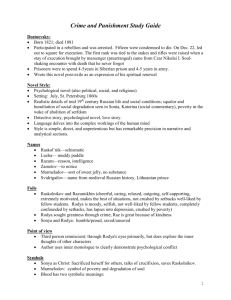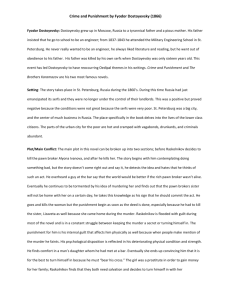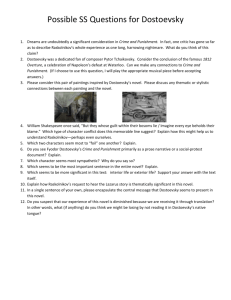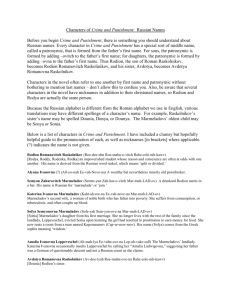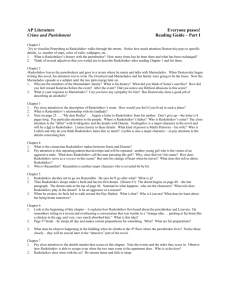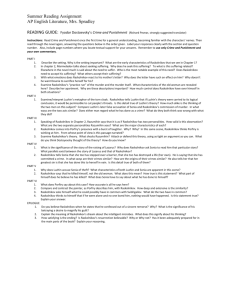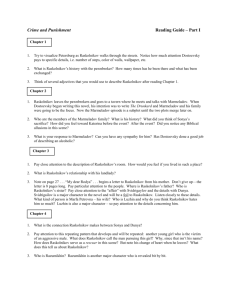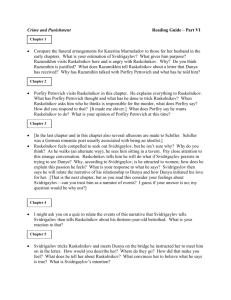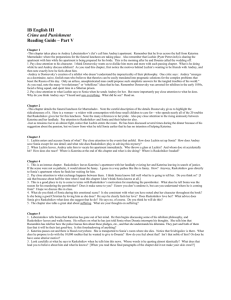Motives for Murder
advertisement
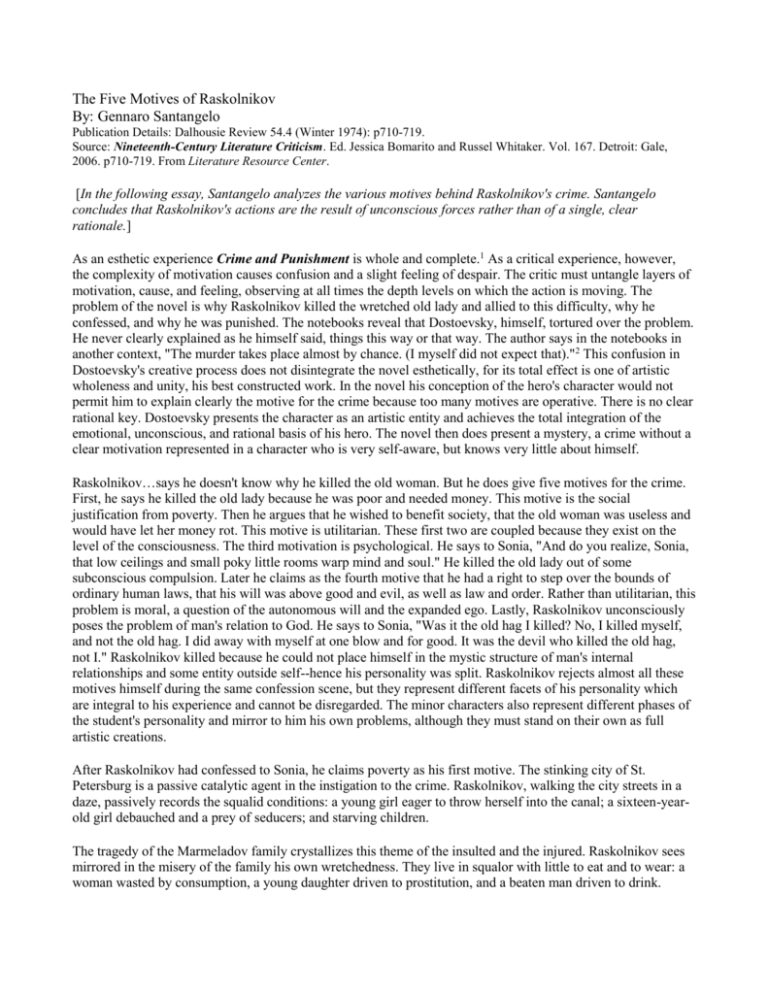
The Five Motives of Raskolnikov By: Gennaro Santangelo Publication Details: Dalhousie Review 54.4 (Winter 1974): p710-719. Source: Nineteenth-Century Literature Criticism. Ed. Jessica Bomarito and Russel Whitaker. Vol. 167. Detroit: Gale, 2006. p710-719. From Literature Resource Center. [In the following essay, Santangelo analyzes the various motives behind Raskolnikov's crime. Santangelo concludes that Raskolnikov's actions are the result of unconscious forces rather than of a single, clear rationale.] As an esthetic experience Crime and Punishment is whole and complete.1 As a critical experience, however, the complexity of motivation causes confusion and a slight feeling of despair. The critic must untangle layers of motivation, cause, and feeling, observing at all times the depth levels on which the action is moving. The problem of the novel is why Raskolnikov killed the wretched old lady and allied to this difficulty, why he confessed, and why he was punished. The notebooks reveal that Dostoevsky, himself, tortured over the problem. He never clearly explained as he himself said, things this way or that way. The author says in the notebooks in another context, "The murder takes place almost by chance. (I myself did not expect that)." 2 This confusion in Dostoevsky's creative process does not disintegrate the novel esthetically, for its total effect is one of artistic wholeness and unity, his best constructed work. In the novel his conception of the hero's character would not permit him to explain clearly the motive for the crime because too many motives are operative. There is no clear rational key. Dostoevsky presents the character as an artistic entity and achieves the total integration of the emotional, unconscious, and rational basis of his hero. The novel then does present a mystery, a crime without a clear motivation represented in a character who is very self-aware, but knows very little about himself. Raskolnikov…says he doesn't know why he killed the old woman. But he does give five motives for the crime. First, he says he killed the old lady because he was poor and needed money. This motive is the social justification from poverty. Then he argues that he wished to benefit society, that the old woman was useless and would have let her money rot. This motive is utilitarian. These first two are coupled because they exist on the level of the consciousness. The third motivation is psychological. He says to Sonia, "And do you realize, Sonia, that low ceilings and small poky little rooms warp mind and soul." He killed the old lady out of some subconscious compulsion. Later he claims as the fourth motive that he had a right to step over the bounds of ordinary human laws, that his will was above good and evil, as well as law and order. Rather than utilitarian, this problem is moral, a question of the autonomous will and the expanded ego. Lastly, Raskolnikov unconsciously poses the problem of man's relation to God. He says to Sonia, "Was it the old hag I killed? No, I killed myself, and not the old hag. I did away with myself at one blow and for good. It was the devil who killed the old hag, not I." Raskolnikov killed because he could not place himself in the mystic structure of man's internal relationships and some entity outside self--hence his personality was split. Raskolnikov rejects almost all these motives himself during the same confession scene, but they represent different facets of his personality which are integral to his experience and cannot be disregarded. The minor characters also represent different phases of the student's personality and mirror to him his own problems, although they must stand on their own as full artistic creations. After Raskolnikov had confessed to Sonia, he claims poverty as his first motive. The stinking city of St. Petersburg is a passive catalytic agent in the instigation to the crime. Raskolnikov, walking the city streets in a daze, passively records the squalid conditions: a young girl eager to throw herself into the canal; a sixteen-yearold girl debauched and a prey of seducers; and starving children. The tragedy of the Marmeladov family crystallizes this theme of the insulted and the injured. Raskolnikov sees mirrored in the misery of the family his own wretchedness. They live in squalor with little to eat and to wear: a woman wasted by consumption, a young daughter driven to prostitution, and a beaten man driven to drink. Through them the reader sees the origin of Raskolnikov's protest. Mrs. Marmeladov spits up her blood on the streets of St. Petersburg in the search for a justice that does not exist on this earth. Old Marmeladov is the first of Raskolnikov's doubles. In the drunkard, the student recognizes his own poverty and that of his family as including them among the insulted and injured. Destitute, Raskolnikov paces his hole like a starving trapped wolf. Marmeladov, the double for these insults in the soul of Raskolnikov, objectifies the conditions which Raskolnikov cannot verbalize, but feels deeply. The motivation of the student revolutionary is quite evident. Raskolnikov killed an old lady in ineffectual fury, to protest the condition of the insulted and the injured. He killed the old woman to protest the wretched conditions of the Marmeladovs, his own wretched condition, and the condition of man who from poverty of soul and body strikes in frustration at the symbol of the wretchedness which chains him. Motivated thus by social consciousness, Raskolnikov emerges as a scapegoat figure, carrying on his back to the martyrdom of Siberia the accumulated guilt, shame, and injustice of the social order. But Raskolnikov rejects this motive. He says to Sonia, "No, Sonia, ... I wasn't as hungry as that and I wanted to help my mother all right, but that wasn't the reason either." He knows that he did not kill the old lady merely to steal her money… This idea is brought back to the student in another double who carries the utilitarian, rationalistic ethic to a grotesque extreme, Luzhin the suitor of Dunya, Raskolnikov's sister. He is an opportunistic, hypocritical liberal, the type of the nouveau-riche bourgeois who justifies any theory on the basis of utility. Raskolnikov hates Luzhin passionately because in him he sees reflected in a glass darkly the image of himself as intellectual justifier of his crime. Luzhin is a parody of the greatest good of the greatest number, that in a new dispensation all will be permitted, and that the sanctity of the individual is a prejudice carried over into the present age. In the notebooks Dostoevsky says, "The fiance [Luzhin]--he unfolds completely for him [Raskolnikov] a theory by which one is justified in killing."4 Just as the sinners in Dante's Inferno see in their punishments the true reflection of their crimes, so also Raskolnikov sees in Luzhin the true reflection of his utilitarianism and hates his double passionately. But Raskolnikov also rejects this motive verbally in his confession, "I know--I know it! The old Lady wasn't a louse," he replied, looking strangely at her. Later he says, "I did not commit this murder to become the benefactor of humanity by gaining wealth and power--that, too, is nonsense. I just did it; I did it for myself alone, and at that moment I did not care a damn whether I would become the benefactor of someone, or would spend the rest of my life like a spider catching them all in my web and sucking the living juices out of them." Dostoevsky has Raskolnikov reject the ravages of the dangerous intellect within himself by rejecting Luzhin and all he stands for. These two motives are rational theories which Raskolnikov first mentions in his confession to Sonia because they exist on the conscious level. After discussing the utilitarian motive for some time, he says to Sonia, "There are quite, quite other motives here. I haven't spoken to anyone for ages Sonia. I have an awful headache now." He is breaking through the level of the consciousness, finding it difficult to unlock repressed unconscious motives. The headache is a reaction to the pain of revealing what he has attempted to keep hidden. Instead of the psychoanalytic couch with an administering psychiatrist, Raskolnikov reveals himself to Sonia whose gentle prodding, total unselfish commitment, and love, help to unlock the murderer's unconscious. After complaining of the headache, Raskolnikov speaks vaguely of feelings and dreams because he cannot verbalize his subconscious motivations either through a failure to understand them or admit them to himself. This third motivation is the unrevealed motive of the unconsciousness, the unresolved psychic conflicts, especially sexual, that motivated the crime. Raskolnikov is obviously a neurotic. Many of the characters at one time or other think him mad. The basis of this neurosis could easily be incestuous. Early in the novel he had said, "Mother, sister--how I loved them! Why do I hate them now? Yes, I hate them. I hate them physically. I can't bear them to be near me." Dunya is his primary incestuous fixation. He opposes Luzhin violently not only as a pseudoliberal, but also as a rival for Dunya's affections. He has his sister and mother sit with Sonia, an attempt to lower them to the prostitute's level so that he can be free to possess them. This unresolved incestuous tendency explains his attachment to sickly, sexless girls like his landlord's daughter and Sonia.5 These neurotic tendencies lead to guilt feelings that cannot be eradicated and explain Raskolnikov's desire for punishment even before he commits the crime. He does everything to reveal himself because he wishes to suffer in order to alleviate the feelings of guilt. This guilt and subsequent desire for punishment become so strong that he commits the murder. In killing the old woman and her sister, he is actually killing his mother and sister. His insistence on using only a sharp-edged weapon, such as a knife or axe, symbolizes his desire to cut away those objects that have inhibited his psychic development. This attack is aimed at Lizaveta who represents his sister. He kills the old woman with the blunt end of the axe, but splits the sister's head open; some of the phallic implications of this act should be obvious. But the murder has solved nothing… Possibly as a result of this unresolved sexual problem, Raskolnikov's personality has been split. His name in Russian means either dissent or schism. This split is revealed in the dichotomies that exist in his reason and his emotions. Unable to resolve the problem, he kills the old woman to find in her death the proof of his superiority. The murder resolves nothing and is a meaningless act. Raskolnikov recognizes that he would be a louse after and knew it before he committed the crime. He cannot integrate his character as he vacillates between self abasement and self assertion. The only answer to such a split is suicide. Dostoevsky had thought of ending the novel with Raskolnikov's suicide.6 If the novel is a psychoanalytic casebook, then the ending has to be considered inconclusive because Raskolnikov's mental structure would not appear to change. Raskolnikov cannot reject the neurosis himself because he is not totally aware of it. This approach can be useful. Certainly it makes some sense of Lizaveta's murder. And Raskolnikov's erratic behaviour must be considered the product of an unbalanced personality. This critical approach, however, which looks upon the novel as a case book, a story of a personality disturbance, can swallow up all the others, relegating them to minor internalization of deep-seated neurosis. Another irrational motive, the fourth, is the will to power, what I prefer to call the theory of the autonomous will. During the confession, Raskolnikov says to Sonia, after rejecting the theory about the thoughts aroused in his lonely room leading him to the crime, that the lawmaker is above good and evil. While the utilitarian motive is completely rational (I committed the crime to gain such and such an end), this desire becomes an irrational necessity, a dare, a megalomanic compulsion. Napoleon considering his career is utilitarian: Napoleon above human laws wading through blood as an exercise for his own grand personality is irrational, a megalomaniac. The human agent is above all moral considerations and steps over the boundaries of good and evil because these categories do not exist for his own autonomous will. Like the Byronic hero, he attempts to assert absolute freedom. The moral freedom of choice is a fundamental in Dostoevsky's moral dialectics, but this freedom is not only the freedom to do good. Such a concept leads to tyrannical socialism, constrained predestination, and the ideas of the inquisition. For freedom to be exercised, evil must exist to be chosen. Such a freedom entails the possibility of great wrong, which leads to the tragedy of freedom in Dostoevsky's novels. Raskolnikov drives towards freedom, but never frees himself completely and has been perverted. This type of freedom becomes anarchy if it is not connected with some object outside itself freely chosen. If a leap of faith based on intuition is not made, the subject is lost in the dark path of his own autonomous will. This terrible freedom lays possibilities for tragic action in man's way. Svidrigaylov represents Raskolnikov's double in terms of the free autonomous will. From him, Raskolnikov has mirrored many of his own theories. Svidrigaylov believes strongly in the right to trespass all bounds. He has no particular feeling of guilt about all this and sees life as a total amusement… The critic must consider God or something like him when discussing the ontological motivation for the crime, Raskolnikov's fifth motive. The autonomous will represented a moral, ethical consideration. The ontological or mythic, religious problem involves a religious dimension. Sonia exclaimed, deeply shocked, that God had handed the student over to Satan and Raskolnikov replied that he imagined Satan tempted him. And later he says, "Was it the old hag I killed? No, I killed myself and not the old hag." In saying that he killed himself, Raskolnikov recognizes that he had split himself and hoped to resolve the problem by eliminating it. This psychological and moral split, looked at from the point of view of Dostoevsky's deep-seated attachment to Russian orthodox religion, is disbelief. Raskolnikov is sick and has turned his hand against himself because he didn't have any self. Lost within himself, he struck out to find the truth. The desire for freedom is the mystic way to faith, but the sick Raskolnikov did not see it. He struck in hatred against himself so that he might avoid the self confrontation of a man without belief. But this burden of terrible freedom which he took upon himself had no adequate object to which it could attach itself, nothing really to choose. Looking outside himself, Raskolnikov found nothing and looking inside he found chaos and anarchy. He rejected humanity and God, subconsciously realizing the nature of his sin, and finally killed the old woman to prove that he was lost. The ambivalence of this murder then becomes apparent, for it represents the rejection of humanity, but Raskolnikov in his desire to be punished for the crime (a critical truism which most critics accept) mysteriously sought also salvation, because through suffering he might redeem himself. This theme of the loss of identity without God finds its symbolic double in Sonia. Instead of distorting the image to the hideous as the other doubles had done, she purifies the image of Raskolnikov as he might become…. Raskolnikov thinks he is a rebel against any entity outside himself. Unable to determine what he is because he has no outside referent, he loses a sense of his own personality and is split. To establish his identity he strikes and hopes to kill in himself his fixed place in the dialectics of eternity. In so striking he seeks the punishment that will identify him with humanity…The abstractions must not replace, however, the artistic integrity of the work. Raskolnikov is not a philosopher making abstract reflections on life. Capable of inflicting great wrong, he is also capable of great compassion. Strong and self-willed, he is also insecure and humble. Dostoevsky delves into the character to trace the diverse branches of behaviour to one common trunk, the core of Raskolnikov's character. He is not many persons, but one person. Also the other characters are not isolated from the centre of the action. They represent human beings, not as complex as Raskolnikov, who are struggling with moral problems that the student himself cannot solve. The novel is artistically integrated, a realistic portrayal of misery viewed on the social, psychological, and religious levels. Why did Raskolnikov kill the old lady? Is there one motive that explains the action? They are all compelling because rarely is a man the product of one force. All actions are intertwined with depth levels of motive that rest in the unconscious. Dostoevsky had the courage to present a man in the totality of his personality. Raskolnikov's crime was a personal, social, moral and religious act.
